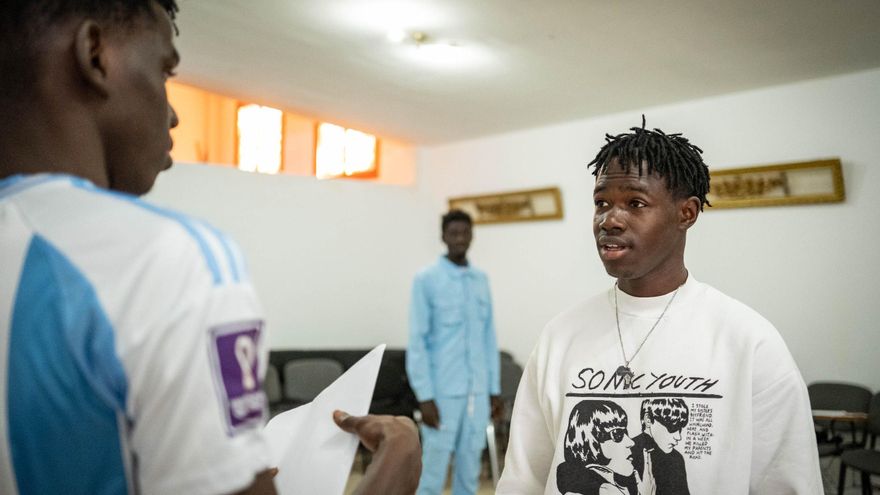
This time, any similarity to reality is no coincidence. Theatre, pure theatre, as the timeless words of La Lupe say. A group of African youths are currently engaged in rehearsals like any other amateur troupe in Tenerife prior to their debut. Here, the essence of performing arts is on full display, as what they portray is their own narrative. Their performance draws on events as genuine as the harrowing migration through the perilous and fatal sea route of the Canary Islands. The twelve individuals, aged between 18 and 27, mostly hailing from Senegal, alongside others from Gambia and Guinea Bissau, arrived one day to this land just like numerous other migrants in a canoe.
Mabel Quintero, the theatre director from the Good Samaritan Foundation, a humanitarian group that has provided them refuge on the island, guides them with affection and patience through a script that they are intimately familiar with because they have lived out its narrative firsthand. They are set to present their work this coming Friday at 8:00 p.m. in the ULL Auditorium, making their debut with Bismillah: Migrant Stories. As typical in theatre, nerves abound.
Reception
The afternoon feels chilly in Santa Cruz, but the community halls of San Alfonso María de Ligorio church in the Los Gladiolos neighbourhood exude warmth, welcoming those who arrive. There, the twelve young Africans recall their authentic experiences, blending fiction with reality.
Bureaucracy
Today’s scene recreates the lengthy and complicated journey that takes years to navigate paperwork, achieve legality, and realise the dream of securing employment. From the frustration, anger, and sadness associated with bureaucratic obstacles, to the joy of finding a job, even if just temporary. Mabel directs, instructs, pauses, reminds, and corrects to the tunes of Rave Bolero sounds (which could easily be Mabel’s). The narration is delivered by Colombian David Restrepo who, alongside his compatriot and props manager, Juan Camino, adds a voluntary Latin American flair to this self-creation project from inception to conclusion. David’s distinctive accent modulates the varying degrees of pace and accuracy exhibited by the protagonists. It’s important to remember that they are not professionals. Some are more enthusiastic, while others may be a bit lethargic today, yet all are driven by the belief that the concept and the challenge will flourish.
Book
Previously, they succeeded with a book titled The Trip, a self-published outcome that they unveiled last December at the University of La Laguna, detailing their life-altering maritime journey. Now, they will complete the circle with this theatrical performance. Their aspirations remain unfulfilled as the ultimate goal is to find work here as electricians, carpenters, in construction, or even in journalism, as they express. It will be challenging; for now, it remains a wish, but they are making considerable strides.
Talent
According to one of the protagonists, Abibo Abdaf Danfa, “we need everyone to read The Trip and witness the performance so that they can grasp what we have endured and, above all, who we are; “Not only do we arrive by boat, but we also possess talent.” He believes that this “can transform the mindset of those who read or observe it as it prompts reflection.” He concludes: “For me, collaborating with my peers has instilled a sense of pride because this is why I came: to learn and work towards a more dignified life.”
Stories
Literature and theatre merge to place shared narratives at the forefront with the aim of raising awareness about migration from a perspective of exchange and social change. They also incorporate genuine alternatives that can assist in ensuring that African youth are not compelled to undertake these perilous and uncertain journeys, such as the initiative by the Canary Islands Foundation El Buen Samaritano for the establishment of the Hotel Escuela Hogar Baobab in Kayar, the hometown of most of them in Senegal.
Theatre
This Friday the 31st at 8:00 p.m., at ULL Paraninfo, is the day and hour of the premiere of Bismillah. Migrant Stories. The synopsis sufficiently conveys the full essence of the piece. It is promoted as follows: «Imagine that resources, opportunities, and dreams are extinguished in your homeland… Imagine that the only escape is towards an uncertain horizon, an enormous sea that offers both hope and peril. Now envision reaching the shore, believing that your journey has concluded, only to uncover that the real challenge is just beginning. The individuals in this performance do not need to imagine it; they have lived it. With the same bravery that propelled them onto the boat, twelve young migrants step onto the stage this time to narrate their experiences in the first person.
Classes
This showcases what has been learned and shared in the theatre classes at the El Buen Samaritano Foundation, aimed at forging a link between the Canary Islands and Africa. They themselves clarify that bismillah means “giving thanks to God” in Arabic as an expression of gratitude and contentment. A term that embodies them and is always present in their daily lives.
Life
Currently, they reside in the Foundation’s shelters dotted across various locations in the Metropolitan Area of Tenerife. Their training process encompasses knowledge in agriculture, culinary skills, sewing, carpentry, masonry, and welding each morning, alongside Spanish lessons and local cultural integration. In the afternoons, complementary activities are organised to reinforce language and culture, in addition to developing social and cognitive skills. Father Pepe emphasises that “the key aspect of this model, including the play, is that we have endeavoured to make them the protagonists throughout the entire process. “They narrate their experiences to the community here in order to dismantle numerous preconceived notions.”
Conjure
The rehearsal concluded the narrative, preparing for the objective set for next Friday. A message to Seydou, Abibo, Musta, Kama, Mor, the dancer Djibril, Ibraima, Abdulaie, Ousmane, Ebrima, Bogouma, and Mamadou, along with David, Juan, and, of course, Mabel: good fortune. Or rather, break a leg.















